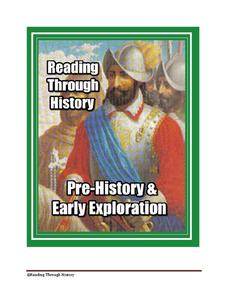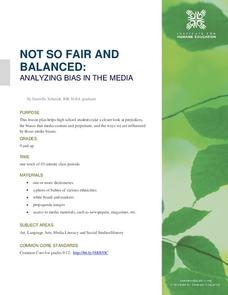Reading Through History
The Battle of Yorktown
The Battle of Yorktown was an important battle of the American Revolutionary War for all sides. Learners read everything from the point of view of the British, the Americans, and finally, the French. After reading, they answer...
Reading Through History
The March on Washington
How does marching get a point across to the government? Teach pupils about civics, human rights, and freedom of speech using the resource about the March on Washington. After reading, learners complete multiple-choice and short-answer...
Reading Through History
The Slaughterhouse Cases
Do modern citizens interpret the Fourteenth Amendment the way it was intended? Scholars study the Slaughterhouse Cases to see how judges interpreted the amendment in the 1800s. Following the reading on the subject, they answer...
Reading Through History
The Cold War: The Space Race
What do the Cold War and the Space Race have in common? Learners search for that answer and many more, helping them to build their knowledge of historical global politics and tensions between nations. Following the reading, they answer...
Reading Through History
The Federalist Papers: Federalist Paper No. 10
James Madison, under the pen name “Publius,” justifies the need for an American Republic in Federalist Paper 10, which is perhaps one of the most influential contributions to the Federalist Papers. Readers examine his perspective with...
Reading Through History
Early History and Exploration Unit
We all know about Christopher Columbus, but who else explored the Americas, and specifically, the future United States of America? Learners find out these answers and more in a resource that includes four different reading sections,...
Reading Through History
The Fugitive Slave Act of 1850
Why was the Fugitive Slave Act of 1850 so important? The reading in the resource discusses how the act affected Southerners, Northerners, and the slaves themselves. Scholars complete the reading as a form of direct instruction while...
Judicial Learning Center
Separation of Powers/Qualifications of Office
Time to work together in class to understand the separation of powers as well as the qualifications for office! The resource includes terms to review for pre-knowledge before beginning instruction. Following the review, pupils work on a...
Judicial Learning Center
The Bill of Rights and Civil Liberties
Why is the Bill of Rights so important to American's civil liberties? An important resource helps scholars find these answers and more by reading through state and federal constitutions to discover their own civil liberties. The activity...
Judicial Learning Center
Do You Know Your Bill of Rights?
The Bill of Rights is much more than an important piece of paper! The rights cover everything from freedom of speech to the right to remain silent if arrested. Scholars find out their own rights by answering the questions in the form of...
Judicial Learning Center
Article III WebQuest
Why is Article III of the constitution so significant? Pupils discover the importance of Article III and how it relates to past as well as current events by completing Internet research using a provided handout. They learn everything...
Judicial Learning Center
The Federalist Papers and The Federal Judiciary
Pupils work in groups or as individuals to read about and then discuss the Federalist Papers. To finish, they write essays about an assigned topic dealing with the Federalist Papers and the federal judiciary.
Judicial Learning Center
Rule of Law WebQuest
Go on a WebQuest to find the Rule of Law! Scholars use the Internet to learn all about how law works in a democracy and how the Rule of Law relates to both American government and governments around the world. Researchers then engage in...
iCivics
Mini-Lesson: Midterm Elections
Find out the differences between presidential and midterm elections with an informative resource. Pupils discuss the importance of midterms to the presidency and how midterms affect the balance of government branches. They also fill out...
Curated OER
Turning Assets into Action in the Fight Against Hunger
How can one person change the world? Scholars research and analyze the topic of world hunger. Using video clips, parodies, and primary source evidence, they uncover a current campaign to end world hunger. Collaborative groups openly...
National Endowment for the Humanities
Kate Chopin's The Awakening: Searching for Women and Identity in Chopin's "The Awakening"
The final lesson of a three-part series on Kate Chopin's The Awakening has scholars investigate life as a woman in late nineteenth-century America. They research the role of women in society through the eyes of the characters in the...
National Endowment for the Humanities
Kate Chopin's The Awakening: Local Color in the Late 19th Century
Kate Chopin's The Awakening introduces readers not only to the lush Louisiana setting of Grand isle but also to the nuances of Creole culture. the second lesson in a three-part series examines how Chopin's use of literary realism and...
Institute for Humane Education
Not So Fair and Balanced: Analyzing Bias in the Media
Life is not always fair. Who's heard that before? This same concept moves to a larger scale using prejudice and bias. Pupils discuss where prejudice attitudes derive and how they develop throughout life. Reading comprehension...
Orlando Shakes
Twelfth Night: Study Guide
From lonely to luggage, it would be nearly impossible to have a modern-day conversation without using words that William Shakespeare coined. A Twelfth Night study guide introduces individuals to fun Shakespeare facts as they participate...
Education Fund
Fear the Scarce Resources
In a life or death situation, what resources would you choose to survive—and why? A zombie attack simulation teaches learners the concepts of scarcity and resources in regards to economics. The hands-on activity requires individuals to...
New York State Education Department
Global History and Geography Examination: January 2014
Scholars write an informational essay with a practice examination. The resource includes comprehensive multiple-choice questions dealing with everything from the creation of the European Union to changes in oil prices across the globe.
Curated OER
“Everyone Else Does It!” Ethics Project
Do you have good ethics? How about good morals? Scholars investigate the role business ethics, morals, and values play in society. Through role play, group work, and readings, they uncover the basis behind the importance of being...
Society for Science & the Public
Easter Islanders Made Tools, Not War
When studying artifacts, especially tools, how do archaeologists determine what the devices were used for? In what ways might researchers' previous experiences influence their perception of an artifact? An article about researchers'...
US National Archives
Benjamin Franklin: Politician and Diplomat
A scientist, inventor, entrepreneur, politician, and the founder of a nation—and that's just one person! Learners investigate the many lives of Benjamin Franklin. Using a hands-on interactive online resource, they analyze primary...

























